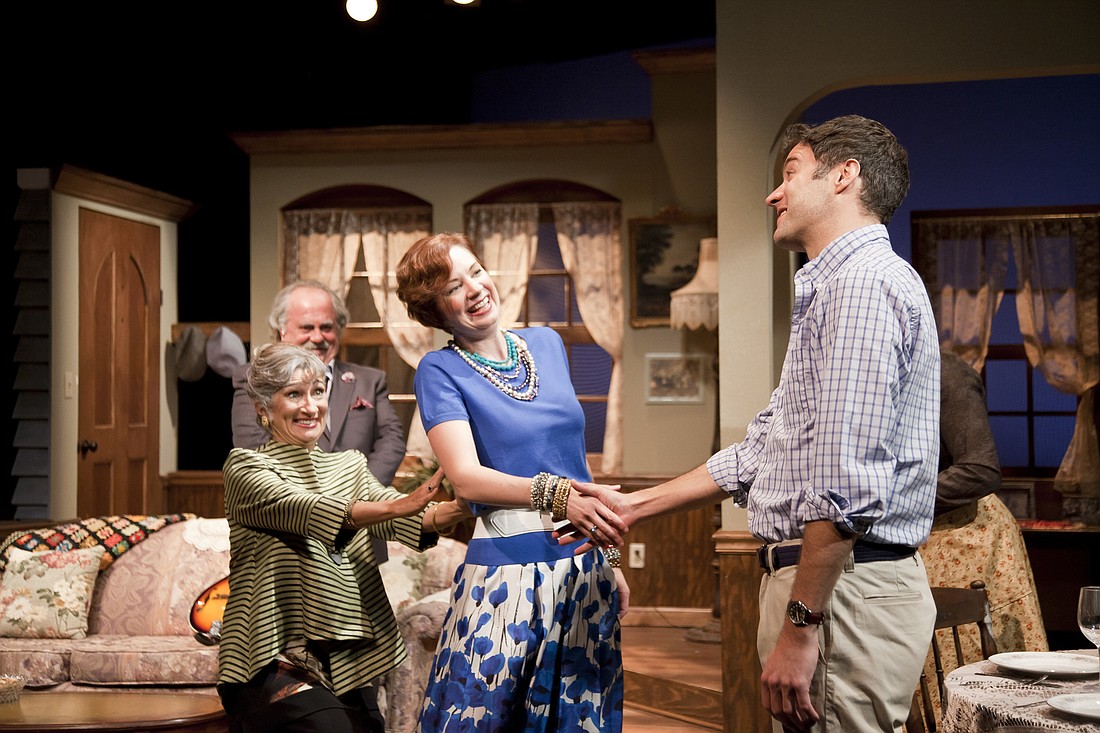- May 16, 2025
-
-
Loading

Loading

Joe DiPietro’s “Over the River and Through the Woods” is taking us to grandmother’s house at Florida Studio Theatre. Strictly speaking, it’s taking Nick Cristano (Matthew DeCapua) to weekend visits with all four of his 80-something grandparents in Hoboken, New Jersey in the late 1990s. (He’s probably crossing the Passaic River. I’m not sure where he runs into the woods.) Like the playwright, Nick is an Italian-American. His grandparents are, too. In contrast to the Sopranos, they’re actually nice. Perhaps too nice — if not overbearing. As much as Nick loves them, he wants to get on with his life.
As luck would have it, he can.
Nick’s a hard-charging, 29-year-old marketing executive in New York City who’s just landed a promotion that’ll take him away to Seattle. Naturally, his grandparents hate the idea. They concoct a scheme worthy of Lucille Ball to keep Nick in town: They try to set him up with a pretty girl from the neighborhood named Caitlin (Caley Milliken). One fine day, Nick shows up for the weekly dinner and, badabing, there she is. The scheme almost works; against all odds and his own common sense, Nick is instantly attracted to her. Problem is, Nick’s constant put-downs to his grandparents are a turn-off to Caitlin; she rejects his request for a date. (That’s what playwrights call a “complication.”) What happens next? Door #1: Nick stays and marries Caitlin. Door #2: He marries Caitlin and takes her to Seattle. Door #3: Nick leaves for Seattle all by himself. (Read to the end and find out. Or don’t and be surprised.)
Either way, don’t worry about it.
The family dynamic counts far more than any twist ending in this play. “Tengo Famiglia!” is the motto of all four of Nick’s grandparents. (The literal English translation is: “Support your family.” In Italian, it’s more like: “I do right by my family. That’s my reason for living — what’s your problem?”) Both sets of grandparents dote on Nick, but stop short of turning on the air-conditioner before July. Emma (Marina Re), his paternal grandmother, offers him mass cards for all occasions. Her husband, Nunzio (Andy Prosky), keeps his own council and hides his pain. On the parental side? Grandmother Aida (Rita Rehn) is a food-pusher who plies Nick with cannoli, lasagna, you name it. Grandfather Frank (Eric Hoffmann) is a mensch who feels infantilized because he’s too old to drive. Frank made his own journey to America as a child against his will — and is devastated that Nick’s leaving his family on purpose.
These loud, passionate characters all love their grandson — and embarrass him in every possible scenario that old age rubs youth the wrong way. But it’s not all bad. The stand-out, laugh-out-loud scene is a game of Trivial Pursuit. Frank launches into a mad process of free association that ultimately and improbably yields the right answer. (Washington Irving.) Nick’s face lights up with love. He clearly wouldn’t change a thing.
Kate Alexander directs this material like she’s introducing the audience to old friends. But DiPietro’s characters might seem familiar even if you’ve never seen the play. The loud loving Italian family? They’re archetypes verging on stereotypes. It’s sitcom territory, but to be fair, with the exception of plays involving heads in jars and doomed families in Sweden, most theater is. Alexander keeps it real and the actors do the same. Credit is also due to costume designer Yuri Caltaldo and scenic designer Jeff Dean for creating the believable details of a specific time and place.
It all adds up to a crowd-pleasing night of theater. But Alexander, the actors, and the rest of the creative team aren’t trying to please the crowd. They’re simply trying to be honest, and that’s always better. You could say the same about the playwright.
In the hands of a manipulative writer, DiPietro’s warm-hearted slice of Italian-American life could’ve easily been sticky and sentimental. But the playwright looks two hard truths in the eye without flinching: The hurt a young man’s need for independence brings to his family and the here-today-gone-tomorrow nature of life. That transitory truth is the big reason this isn’t a sitcom. TV Land exists in a state of perpetual stasis. In real life, nothing lasts forever. That applies to DiPietro’s fictional family, too. Things change. People leave. People die. Even the ones you love.
Sorry for the spoiler. But it shouldn’t be a surprise.